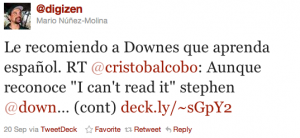My Teacher Is an App
A recent article on The Washington Post opens up in my mind a serious dilemma. This is a very fluid time for education. Many ingredients, new and old, are boiling in the cauldron, and nobody knows what will come out. Sometimes byproducts emerge which can put in danger our health, though. One real threat comes from the US trend to use Distance or Online Education as an outsourcing strategy to cut schooling costs down, reduce the number of teachers, and –this is serious– to bypass teacher unions or associations.
The Washington Post subtitles the article thus: More kids than ever before are attending school from their living rooms, bedrooms and kitchens. The result: A radical rethinking of how education works. However, in the paper, there is no trace of a rethinking of how education works. There is something going on that is changing how education works without thinking at all and without discussion: that’s the problem, in my view. This is what’s happening:
Although some states and local districts run their own online schools, many hire for-profit corporations such as K12 Inc. of Herndon, Va., and Connections Academy in Baltimore, a unit of education services and technology company Pearson PLC. The companies hire teachers, provide curriculum, monitor student performance—and lobby to expand online public education.
Thus, first states and districts begin to adopt Online education as an educational enhancement or as a cost-saving paradigm, or both. Then, in a very minor key, without fanfare and discussion, they outsource Online Ed management to private companies.
The result is that it’s private companies –not school districts or the state departments of education– who hire and manage teachers.
Advocates say that online schooling can save states money, offer curricula customized to each student and give parents more choice in education.
…What does this exactly mean?? Curricula customized to each student? Are we fooling ourselves?
And in Miami, students at iPrep Academy work in free-flowing “classrooms” with no doors or dividing walls but plenty of beanbag chairs and couches. Teachers give short lectures and offer one-on-one help, but most learning is self-directed and online.
“If it seems strange, that’s because it is strange,” says Alberto Carvalho, superintendent of the Miami schools. But he sees no point in forcing the iPod generation to adapt to a classroom model that has changed little in 300 years.
Fortunately, there is somebody who thinks about education and who is exploring alternatives to the traditional lecture-based schooling. But that exploration is happening in the atom world, not so much online.
The growth of cybereducation is likely to affect school staffing, which accounts for about 80% of school budgets. A teacher in a traditional high school might handle 150 students. An online teacher can supervise more than 250, since he or she doesn’t have to write lesson plans and most grading is done by computer.
So, this is the bottom line. Money. I had to underline this last sentence: since he or she doesn’t have to write lesson plans and most grading is done by computer. Why doesn’t she? I don’t see the reasoning, here. A class is a class is a class. You do need to make lesson plans, assessment, and you need to do dialogue with students. Grading done by the computer? OMG, weren’t we discussing the ills of the testing system? Do we really want to continue to believe in quizzes?
In Idaho, Alan Dunn, superintendent of the Sugar-Salem School District, says that he may cut entire departments and outsource their courses to online providers. “It’s not ideal,” he says. “But Idaho is in a budget crisis, and this is a creative solution.”
So, they *are* replacing teachers with online learning: after all we’re in crisis. I rest my case. #occupyeducation







